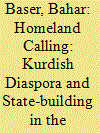| Srl | Item |
| 1 |
ID:
159236


|
|
|
|
|
| Summary/Abstract |
The Kurdistan Region of Iraq (KRI) has regional autonomy within Iraq and it has been undergoing institution- and state-building for the last decade. The Kurdish diaspora has played a major role in this process by providing vital assistance to reconstruction and development efforts. This article examines the interactions between the Kurdistan Regional Government (KRG) and its diaspora by focusing on the diaspora engagement initiatives formulated by the KRG. The arguments are based on extensive fieldwork (2012–2016) that the author conducted in the KRI and Europe, including interviews with diaspora members, returnees and policy-makers.
|
|
|
|
|
|
|
|
|
|
|
|
|
|
|
|
| 2 |
ID:
158927


|
|
|
|
|
| Summary/Abstract |
The growing literature on diasporas’ involvement in homeland conflicts shows that diasporas have the power to influence political, social and economic developments in their country of origin and residence. Although this is an emerging field of research, there is still much to discover about the roles that diasporas play in conflict resolution and transitional justice. This article intends to fill this gap by scrutinising the Kurdish Diaspora as a case study. It explores the intricacies of integrating diasporas into conflict resolution by analysing approaches of homeland actors and fragments within diaspora throughout the different stages of the peace processes.
|
|
|
|
|
|
|
|
|
|
|
|
|
|
|
|
| 3 |
ID:
166658


|
|
|
|
|
| Summary/Abstract |
As of today, a highly mobilized Kurdish diaspora and its most prominent representative, the Kurdistan Workers’ Party (PKK), has become so influential in the European political arena that it might tip the balance of the European Union’s policies on Turkey in its favor. Since too much attention has been given to the PKK’s activities in Germany, the organization’s actions in Britain remain understudied, despite the fact that Britain has been a vital place in Kurdish politics and political lobbying activities. Drawing on fieldwork findings, this article attempts to explore both the evolution and the political activities of the PKK in Britain across three different timeframes, from 1984 until the present time. Our findings suggest that in Britain, the PKK has departed in recent years from its conventional terrorist activities and transformed into a lobbying power that is likely to gain full legitimacy (i.e., being de-listed from terrorist organization lists) in the near future.
|
|
|
|
|
|
|
|
|
|
|
|
|
|
|
|
| 4 |
ID:
156899


|
|
|
|
|
| Summary/Abstract |
Germany might be considered as the European country that has suffered the most from the spatial diffusion of Turkey's internal conflicts. It has received the highest number of Kurdish migrants in Europe and it became the core of Kurdish mobilization in transnational space. Germany's approach to the Kurdish Question on its own soil—combined with the strategies that the Kurdish activists used—determined the scope of opportunity structures for the mobilization of the Kurdish movement. This article explains how Kurdish activism has come to be perceived in Germany, and analyzes the German political environment by focusing on the criminalization and stigmatization of the Kurdish movement, especially during the 1990s. It then describes the discursive shift and change in framing strategies that the Kurdish diaspora experienced after the capture of the the Kurdistan Workers' Party's (PKK) leader in 1999. Lastly, it touches upon the recent developments in the Middle East, especially in Kobane, and their impact on the image of the Kurdish movement. The article is based on extensive fieldwork in Germany and includes testimonies of Kurdish diaspora activists, with a focus on their own perceptions about their situation and how they respond to securitization policies in the host country.
|
|
|
|
|
|
|
|
|
|
|
|
|
|
|
|